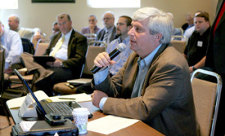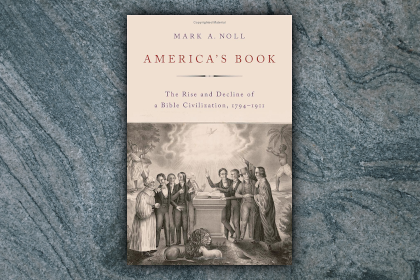Signs? Prophets? Miracles?
 Reprinted with permission from Baptist Bulletin Sep/Oct 2013. All rights reserved.
Reprinted with permission from Baptist Bulletin Sep/Oct 2013. All rights reserved.
Council on Dispensational Hermeneutics meets
CLARKS SUMMIT, Pa.—“Traditional dispensationalists do not have a place where we can go to talk to each other,” says Mike Stallard as he welcomes the Council on Dispensational Hermeneutics, meeting on the campus of Baptist Bible Seminary, Clarks Summit, Pa.
Stallard, the seminary dean, is explaining why the council was formed in 2008, and why the steering committee has planned two days of talk. Lots of talk.
Thirty theologians sit at the front of the room at long tables, members of the council. Most of them have their laptops open, looking at papers while the author reads them to the group. The wonky presentation style is familiar to anyone who has attended an academic conference, except the schedule leaves plenty of time for questions. Stallard describes it as “more of a discussion group than a presenter group.”
Eager to avoid the “all talk and no action” reputation of academia, the council invites pastors to observe and participate in the discussion. The stated topic has practical ramifications for church ministry.
All evangelicals affirm the Biblical record of miraculous signs and wonders in the early church. These sign gifts included prophetic revelation, speaking in tongues, interpreting tongues, healing, and other miracles.
But when the question turns to the present day, the evangelical world is divided into three camps: Cessationists believe the sign gifts were unique aspects of the early church and apostolic era, but have since ceased. Continuationists believe that sign gifts such as prophetic revelation, speaking in tongues, and healing have continued to this present day. And there’s a third group that’s harder to pin down, those who describe themselves as open but cautious, a mediating position adopted by many evangelical leaders and theologians.
Most of the council members came from church groups that have formal statements about the cessation of sign gifts. For instance, the GARBC Articles of Faith reads, “We believe that the sign/revelatory gifts of the Holy Spirit have fulfilled their purpose and are not applicable to the work of the Holy Spirit today.”
Stallard says that most traditional dispensationalists—and nearly all of the conference participants—are cessationists, a position that flows naturally from their ideas about Bible interpretation and systematic theology. A few would describe themselves as open but cautious, a description that usually requires further explanation.
“Our council membership does not have charismatics or Pentecostals. We do not have progressive dispensationalists or ultra dispensationalists,” Stallard said when introducing the conference. “That doesn’t imply that we hate them or think they are less than dedicated. We just disagree with them, and we do need to address what other positions have to say.”
While the participants are generally content with the cessationist label, they realize its negative vibe, somewhat like describing oneself as anti-abortion instead of pro-life. George Gunn acknowledged the possible baggage during his chapel session. “I think that sometimes people get the impression that we are against this, against that, and against something else. We are frequently viewed as simply being negative,” Gunn told the students and conference guests. “I’d like to begin this chapel message by saying that our position on cessationism can be stated positively as an affirmation of sola scriptura—the Bible as a complete canon, and the Bible alone is the authoritative, inspired, inerrant Word of God.”
Gunn’s words, while accurate, point to a problem that motivated the conference discussion. Many young and Reformed thinkers would happily affirm sola scriptura while retaining an open attitude toward modern-day prophecy and tongues-speaking. This developing generation of leaders has several well-known role models who teach the continuationist position within the framework of a conservative theological position.
As dean of Baptist Bible Seminary, a school that formally affirms cessationism, Stallard sees the results every day. “A lot of the students who come to our seminary would describe themselves as open but cautious when they enroll. But they really don’t yet know what they believe,” he says. “Twenty years ago it was different.”
“When I was a student in the 1970s, charismatic preachers were a small minority of TV evangelists,” says Stallard. “But now they dominate.” Stallard rattles off a list of famous TV preachers everyone would recognize, noting their subtle influence on students and church members.
Current “sign gift” advocates have moved past the dramatic displays, a 1970s hallmark. Now the continuationist position is seen in more subtle ways. Some well-known leaders claim the gift of apostleship; some claim their teachings are prophetic revelations directly from God. So the council members have responded with papers addressing the newest challenges to the cessationist position. And like Gunn suggested, part of their task was defensive, explaining popular misconceptions and wrong accusations.
Cessationists are sometimes (wrongly) accused of opposing any supernatural event, as if to say that God no longer intervenes with great and wonderful acts in the lives of his children. When the subject comes up during a discussion led by Rod Decker, someone bluntly asks if God would perform miracles today.
“I believe in miracles. I’ve seen a soul set free,” interrupts Mark Soto, singing a few phrases of an old gospel song in full voice, making Decker laugh at a common memory. The musical comment was both funny and serious—all of the council members could sing the song; it was in the hymnals of our childhood. The composer, John W. Peterson, was formerly the music director of a GARBC church. We were cessationists, but we were happy to sing about miracles.
And we do more than sing about them. Decker was presenting his material soon after he shared discouraging news from his doctors: terminal cancer. He’s well aware that we are listening to his presentation while praying for a miracle, his miracle. Is the question merely a matter of semantics?
“This question needs to be explored further,” Rod Decker answered. “How will we actually define a miracle?”
Stallard had suggested a solution earlier in the day, offering a careful clarification for some who misrepresent the cessationist position: “Our view is not that healing has ceased, it is that faith healers have ceased.”
The distinction is important to remember on a practical level. As experienced pastors, the council members have spent plenty of time on hospital visitation, praying for healing. So whatever the paper’s stated topic, the discussions often head in a pastoral direction. The concluding session on Thursday night featured pastors who discussed how sign gift issues affect churches. Many reported doctrinal tensions from popular television preachers and best-selling books, teachers who begin teaching charismatic doctrine, missionaries who encounter wrong ideas on the field.
“We have Pentecostals attending our churches because they like the Bible teaching,” Mike Stallard had observed earlier, describing the tensions created by casual attenders who do not embrace the church’s doctrinal position. Several of the panel participants affirmed this problem, then turned the discussion toward solutions based on consistent Bible teaching, expository preaching, and practical ways to nurture Bible literacy.
“We want pastors to be here and to participate in the discussion. We want to be connected to the churches,” Stallard had said when he welcomed guests to the conference on Wednesday morning. “Dispensationalism started as a movement in churches, not the academy. This has been one of our strengths.”
Kurt Seboe, pastor of Northmoreland Baptist Church, was attending the conference for the first time. “This exposed me to issues that I wasn’t aware of. Informative. This helped me to understand people who are going through difficulty, how to offer the Word of God alone as the answer for their lives.”
Seboe also noted the spirit of the presenters, who grappled with difficult issues and sometimes offered conflicting solutions. “They responded in love and truly wanted to find out what the text says,” Seboe says.
The council is guided by a steering committee comprised of Rod Decker (Baptist Bible Seminary), George Gunn (Shasta Bible College), Joe Parle (College of Biblical Studies), Mark Soto (Grace Seminary), Elliott Johnson (Dallas Theological Seminary), and Mike Stallard (Baptist Bible Seminary).
The 2014 Council on Dispensational Hermeneutics will be held at Calvary Theological Seminary, Kansas City, Mo. The steering committee has already chosen next year’s theme, which emerged from a conversation Mike Stallard had with Dr. Walter Kaiser when he visited BBC’s campus.
“You dispensationalists have missed the boat for the last 20 years,” Kaiser suggested. “You have missed the most important thing, defending premillennialism.” So Stallard says next year’s contributions will do just that, offering a fresh look at premillennialism from the perspective of traditional dispensationalists.
KevinM Bio
Kevin Mungons is managing editor of the Baptist Bulletin and editorial director of publications for Regular Baptist Press (Schaumburg, IL). He has previously ministered as an associate pastor and a high school music teacher. He and his wife, Carla, have ten children and live near Chicago.
- 26 views
The need for a more positive descriptive term is something often brought up at Pyromaniacs. Particularly, see this: http://bit.ly/NlWRSy.
It seems to me that the “Open but Cautious” position continues to gain ground. Over 4 years ago I wrote a SI article “Dreams and Visions: Confessions of a Soft Cessationist.” http://sharperiron.org/2009/01/07/dreams-and-visions
In that article I stated - “I must admit my reticence for many years, both dispositionally and dispensationally, to espouse this position. My theology—or better, my “theological environment”—did not allow for what seemed to be incontrovertible evidence that God freely chose at times to reveal Himself in Cornelius fashion to those who have no access to the gospel. Furthermore, I see no biblical warrant to not remain open to the possibility of God’s using dreams and visions if He so decides. As in the book of Acts, this act might be expected in unique pioneer situations or where there is no access to the gospel or no Scriptures in the vernacular.”
Four years later it seems to be that this position is reasonable and biblical. Where the Word stands, the Word stands alone. So I remain suspicious and opposed to claims where the sufficient and authoritative Word is present. God has spoken. We need no other Word. I do not want to hear what others say God told them and am not waiting for God’s voice in my head. I want to hear what God has said in the written Word. I struggle to live according to what He has already revealed. I need no new truth but a better understanding and more Spirit-enabled obedience to the present truth. However, I remain open, optimistic, yet cautious that God may work in ways analogous to Acts as a prelude when the Gospel first enters an unreached people.
Steve Davis
Steve, in all honesty, what does that have to do with sign gifts still being in operation?
1 Kings 8:60 - so that all the peoples of the earth may know that the LORD is God and that there is no other.
I have been wanting to go to that conference for years. One day…..
My problem with identifying as a cessationist is that I don’t see warrant to define “the perfect” in 1 Cor. 13 as anything other than Jesus Christ. I am open but very cautious as I see these sign gifts as more manifested where there is no Scripture in the language of the people being ministered to. So, in the US it would be almost nonexistent but overseas, say in a jungle tribe or desert plains, it would be more prevalent.
Heb 2:3-4 is sufficient reason to be cessationist. In fact, I rarely even mention 1 Cor 13 except that it is certainly possibly referring to the canon.
1 Kings 8:60 - so that all the peoples of the earth may know that the LORD is God and that there is no other.





Discussion